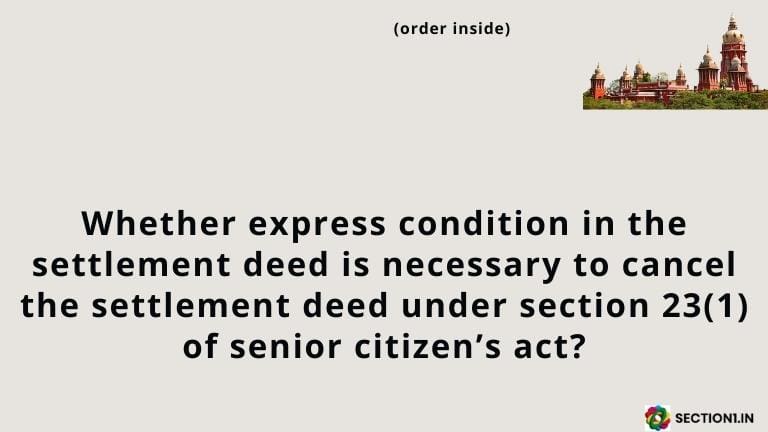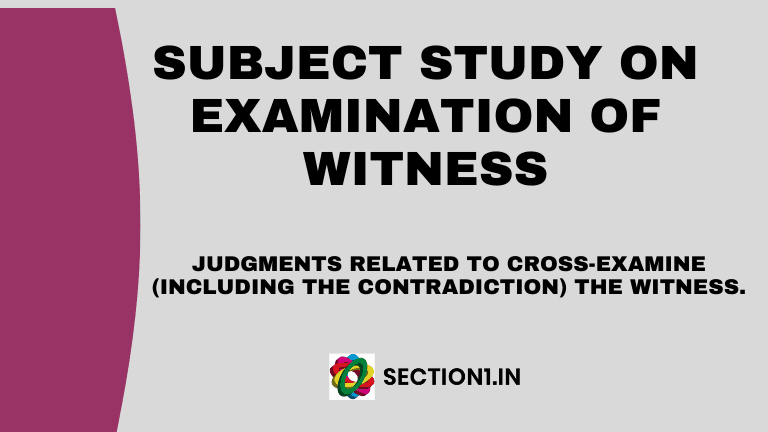Facts of the case
The mother-in-law approached the Revenue Divisional Officer (RDO) after settling the property to her son out of love and affection, with the expectation of being cared for by her son and daughter-in-law. However, her daughter-in-law neglected her responsibilities, leading the RDO to approve her application and cancel the settlement deed under Section 23(1) of Senior Citizens Act. The matter was subsequently challenged before a single judge of the Madras High Court, which upheld the RDO’s decision. Above which Writ appeal was preferred by the Daughter-in-law.
Issue
The important issue that arose for consideration is whether a settlement deed could be cancelled by the RDO under Section 23(1) of the Senior Citizen’s Act in the absence of an express condition in the settlement deed.
Before going into the decision of this case, it is essential to go through the paragraphs of the Sudesh Chhikara Case.
In paragraphs No.12, 13 and 14 of Sudesh Chhikara vs. Ramti Devi and Others, the Hon’ble Supreme Court observed as under;
“12…….for attracting sub-section (1) of Section 23, the following two conditions must be fulfilled:
- The transfer must have been made subject to the condition that the transferee shall provide the basic amenities and basic physical needs to the transferor;
- The transferee refuses or fails to provide such amenities and physical needs to the transferor.
If both the aforesaid conditions are satisfied, by a legal fiction, the transfer shall be deemed to have been made by fraud or coercion or undue influence. Such a transfer then becomes voidable at the instance of the transferor and the Maintenance Tribunal gets jurisdiction to declare the transfer as void.”
“13. When a senior citizen parts with his or her property by executing a gift or a release or otherwise in favour of his or her near and dear ones, a condition of looking after the senior citizen is not necessarily attached to it. On the contrary, very often, such transfers are made out of love and affection without any expectation in return. Therefore, when it is alleged that the conditions mentioned in sub- section (1) of Section 23 are attached to a transfer, existence of such conditions must be established before the Tribunal.”
“14……. Effecting transfer subject to a condition of providing the basic amenities and basic physical needs to the transferor – senior citizen is sine qua non for applicability of sub-section (1) of Section 23.”
Decision
The bench of Justice SM Subramaniam and Justice K Rajasekaran has considered the aforementioned judgment of the Supreme court in Sudesh Chhikara vs. Ramti Devi and interpreted para 13 of the judgment as follows
“38. The Hon’ble Supreme Court in the above case regarding the scope of Section 23(1) of the Act, made an observation that “On the contrary, very often, such transfers are made out of love and affection without any expectation in return” . It would be sufficient to form an opinion that the Apex Court considered the implied conditions in the said case. However, the Apex Court further observed by stating that, if it is alleged that the conditions mentioned in sub-section (1) of Section 23 are attached to a transfer, the existence of such conditions must be established. Therefore, the Apex Court considered that, very often transfers are made out of love and affection, and in the event of any conditions expressly made in the document, it must be established.”
Also cited other judgements of the Supreme Court and came to the conclusion that the implied condition would be sufficient for compliance with the condition stipulated under Section 23(1) of the Senior Citizens Act, and an express condition is perse not mandatory.
46. The facts established in the present case before the Revenue Divisional Officer under the Senior Citizens Act reveal that the senior citizen, during the relevant point of time was 87 years old and she was totally neglected by her daughter-in-law. The settlement deed executed by the senior citizen expressly indicates that out of love and affection, and taking note of future interest of her son. The very expression under the Settlement Deed could indicate that the senior citizen expected that she will be taken care of by her son and her daughter-in-law till her life time. Such an expression in the settlement deed would be sufficient to satisfy the condition stipulated under Section 23(1) of the Senior Citizens Act….
…..The circumstances under which the property was transferred are also to be taken into consideration. Thus, the implied condition would be sufficient for compliance with the condition stipulated under Section 23(1) of the Senior Citizens Act, empowering the competent authority to annul the Settlement or Gift Deed in such circumstances.”
47. The legal position, as narrated in the aforementioned paragraphs, in the context of the principles laid down by the Hon’ble Supreme Court of India and High Courts, makes it clear that the conditions under Section 23(1) of the Senior Citizens Act need not be explicit, but might be implied. The love and affection being the consideration, which can be traced out in the Settlement Deed, would be sufficient to hold that such love and affection is an implied condition that the senior citizen will be taken care of by the beneficiary of the Settlement Deed or gift deed. In the event of neglecting the senior citizen, the deed of settlement or gift is liable to be annulled.
Finally, the Madras High Court dismissed the Writ Appeal due to the daughter-in-law’s failure to fulfil her obligations towards her mother-in-law.
Party
Mr. K. Subramanian (Appellant) vs. Smt. S. Nagalakshmi (Deceased) & Others (Respondents); – W.A.No.3582 of 2024; 06.03.2025; – Judges Name: S.M. Subramaniam and K. Rajasekar – 2025:MHC:706





